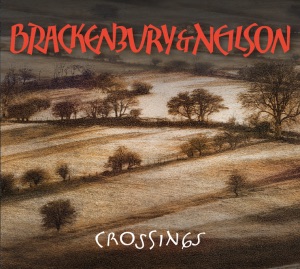 Brackenbury & Neilson: Crossings
Brackenbury & Neilson: Crossings
Monoline Records – Out Now
Crossings represents the first offering from violinist Faith Brackenbury and pianist John Neilson. Featuring material developed over the past five years, it is a superb album that shows off the synergy of their different but complementary musical voices.
Mirroring the title, most of the compositions are named around geographical crossing points of one kind or another. For example, the album was recorded in two locations near Oswestry: Rhydycroesau Village Hall and Wern Mill. Rhydycroesau lies on the Welsh / English border, with Faith Brackenbury living in England and John Neilson in Wales. Similarly, the opening track ‘New Invention’ is named after a small village in Shropshire consisting of only four houses and a crossroads. The point that is being made is that there is potential and energy and creativity to be found in crossing and crossing over, with all of the inherent implications of movement, new horizons and cross-pollination the words and their accompanying actions suggest.
As such, what’s offered throughout is a controlled collision between the violin stylings of Faith Brackenbury and the pianistic approach of John Neilson to stunning effect. Brackenbury’s background in classical, folk and jazz and Neilson’s movement between piano, piano accordion and concertina and their evident musical sympathy means that any given song can shift mood, texture and dynamics at any given moment – all the while maintaining a sense of connectedness and continuity that prevents any piece descending into mere exercises in muscle memory and fingerwork.
Take, for example, ‘The Plastic Bridge.’ Named after the pedestrian suspension bridge over the Nesscliffe bypass, it leans, eventually, towards the jazzier end of the violin world, but there is a rootsy, authentic warmth to Faith Brackenbury’s playing that indicates deep roots in and love for music itself, rather than any one musical landscape in particular. The spontaneous vitality on display prevents the themes she develops becoming a mere pastiche of Grappelli-type swing stylings. Of course, the way that each musician will introduce a theme or pattern that the other will then pick up on and take further indicates what any good performer knows: that the best ad-libs are the ones that you’ve worked on. But there is never a sense that the interplay between the two musicians or movement between sections is prescriptive or that at any point the pair are rigidly following formulaic predetermined arrangements. It feels more as if the general shape and direction of the music and its key themes have been carefully worked on and agreed, and then Andy Bell has been given license to catch their best performances within those predetermined parameters.
It’s an approach that works. Each track is consistently good, delivering music that is always interesting and frequently surprising in the turns it takes. ‘Bonizac’, for example, eventually yields the Breton flavours of the dance tune that has long been at the heart of John Neilson’s repertoire. ‘The Devil’s Aeronaut’ sees Neilson switch to accordion, bringing warmth and heart to a fantastic piece whose title celebrates Vincenzo Lunardi becoming the first man to ascend above Scotland by hydrogen balloon in 1785 – only for the locals to take him for the devil and threaten him with pitchforks! Named after a Sam Beckett poem and collection, ‘Echo’s Bones’ is driven by huge chording on the piano with a mournful underscore on what sounds like viola before a shift to the right-hand end of the keyboard sees Faith follow on the violin. ‘Ynys Enlli’ celebrates the island off the end of Llŷn peninsula. A holy place, it was once a place of pilgrimage, but like all pilgrim’s trails in antiquity, it was only to be reached after an arduous and difficult journey. In this case, the music perfectly captures the foreboding a pilgrim might have felt upon nearing their destination only to find that their goal could only be reached by crossing the treacherous currents of the Bardsley Sound.
‘Crossings’ is not collaboration as the contemporary music industry uses it: a bringing together of two artists with hits in their own right with a view to mining the audiences of both. Such collaborations are never genuinely collaborative or even musical, let alone satisfying.
In that context, ‘Crossings’ is a true collaboration. The musical backgrounds and voices of Faith and John are disparate. Generated via a process of improvisation and then developed into their recorded form over a significant period of time, the material on ‘Crossing’ tends to feel organic and spontaneous, even when the playing and arranging betrays considerable thought and balance. Closing track ‘Wladfa’ is a perfect example of that. Named after the Welsh settlement in Patagonia, its themes hint at Wales and the forms and themes of Welsh Traditional Music, but a lively vitality introduces the sensual cross-rhythms of the South Americas to the mix to stunning effect.
This is, then, music to enchant and mesmerise. There are stylistic and dynamic shifts within any given track while the intricately detailed arrangements are capable of taking the listener on a journey whose landscape and destination will change depending on the mood they’re in when they listen to it. Late at night, it is a soundtrack for introspection. On a bright clear morning, these are hymns to the joy of living. Music for the head and heart, then, that comes highly recommended.
Order Crossings here: http://brackenburymusic.uk/shop/
